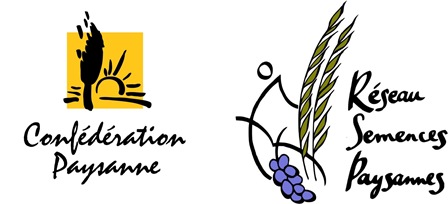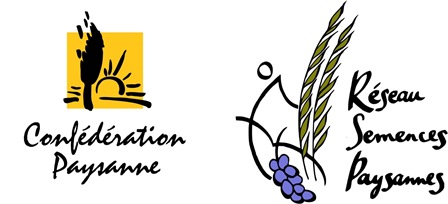 2015-15-12
2015-15-12
MEPs will gather in Strasbourg to debate on a resolution on the patentability of seeds this Thursday, December 17th. The European Parliament must react to the emotion created by the decision of the Enlarged Board of Appeal of the European Patent Office who confirmed last March 25th the patentability of plants obtained by means of natural processes such as crossing or selection1. Indeed, the judge is obliged to apply the law, good or bad, only the Parliament can change it.
The draft resolution submitted to the vote of Parliament pretends to oppose these patents which organize the theft of native seeds and farm animals. Unfortunately, on the contrary, it may facilitate biopiracy. It certainly calls for a ban on patents on plants derived from natural processes of selection, but it does not oppose the patentability of their native genes or characteristics when they are copied and re-assembled by the new techniques of genetic modification. In addition, nothing is mentioned against patents on farm animals. If this resolution were to become law, all plants and animals containing a native gene or character, patented that way, could no longer be cultivated or freely raised, including those which were not obtained by the patented process but by natural selection processes.
Then the proposal claims to “liberate” the seeds and animals confiscated by patents by facilitating access to patented genetic sequences and proteins in order to select others. But only large biotech companies modify genes to select others. Farmers and small breeders could never enjoy such a “full breeder exception.”2. This exception would be reserved to the exclusive club of biotechnologists who would share the total exclusivity of access to the seed and animal heritage selected and kept by hundreds of generations of farmers.
The farmers would have to buy new patented seeds and breeding stock every year. Such dependence would put the right to food of the peoples of Europe in the hands of a few multinational companies which alone could decide what people must eat and even if people can or cannot eat!
The French Senate will be asked to vote on the same subject on 19 and 20 January as part of the debate on “Biodiversity Act”.
The Confédération Paysanne and the Réseau Semences Paysannes3 call on European and French MPs:
- To reject all forms of patent on plants, animals, their genetic components or their native characteristics obtained or that can be obtained by means of natural processes such as crossing or selection.
- To demand a full farmer exception to fully respect farmer rights: the farmer rights to save, use, exchange and sell his own seeds and his own farm animals should not be impede; the farmer rights to sell his harvest, his animals and products derived thereof should not be hindered; his rights to access without license fee to all genetic resources he needs should not be opposed
Contacts:
Guy Kastler (FR) : 0033 6 03 94 57 21
Emilie Lapprand (FR, EN) : 0033 6 43 61 06 26
Roxanne Mitralias (FR, EN) : 0033 1 43 62 18 73
1 So called essentially biological processes in patent law
2 Unlike the breeder exception of the Plant Variety Right Protection (PVP), the breeder exception on patent is not accessible from small breeders or farmers. In the case of PVP, this exception allows the use of a protected plant variety for selecting another by crossing or natural genetic intermixing. This process is accessible to small farmers or small breeders. But patents in Europe are not deposited on plant variety, or on the entire plant genome, but only on a specific genetic trait which may be present in several different varieties. The breeder exception on such patent requires the ability to change this genetic characteristic, which is not within the reach of small farmers and breeders. Small farmers and breeders do not have the necessary resources and equipment for the practice of genetic biotechnologies.
3 French Peasant Seeds Network

